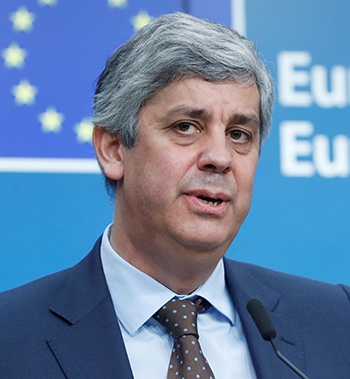In a comparison with the Portuguese soccer star, Portuguese finance minister Mário Centeno has been dubbed “the Cristiano Ronaldo of Ecofin."
Under his watch, his country’s unemployment fell to 8.5%, below the eurozone average; growth shot up from 0.9% in 2014 to 2.6% in 2017; and the country’s budget deficit fell to 1.4%, the lowest level in four decades.

In a comparison with the Portuguese soccer star, Portuguese finance minister Mário Centeno has been dubbed “the Cristiano Ronaldo of Ecofin,” the Economic and Financial Affairs Council of the Council of the European Union. He is set to become the new president of the Eurogroup on January 13, responsible for pushing reforms across the 19 countries in the single-currency bloc.
Even with the stellar reputation he has gained among his peers, his appointment represents a departure from past practices. Centeno is the first person from a Southern European country to hold the post and the first from a nation that had been forced into a bailout by the 2008 financial crisis.
Born and reared in Portugal’s Algarve region and now married with three children after moving to Lisbon as a teenager, Centeno, 51, studied economics and applied mathematics. He later earned a PhD at Harvard and worked as an economist for the Bank of Portugal. “Centeno is a market-friendly labor economist who speaks the language of central bankers and mainstream economists, and who succeeded in complying with EU fiscal rules while governing with the support of the Communists and the radical left,” says Ricardo Paes Mamede, professor of political economy at ISCTE, the University Institute of Lisbon. “His counterparts were impressed enough to give him the presidency, which also serves the purpose of improving the dismal view many have of the Eurogroup.”
João César das Neves, economist and professor at the Católica Lisbon School of Business & Economics, shares similar views. “The European Union likes to present Portugal as the poster child of financial adjustment: Six years ago the country had a financial breakdown, forcing an adjustment program involving the IMF and the EU, from 2011 to 2014. Most of the effort was made before Centeno was appointed minister late in 2015, but his commitment to strong austerity measures is the main reason for his choice.”
The appointment of Centeno also comes amid renewed calls for the creation of a European finance minister’s post. Das Neves, however, is a fierce critic of the idea: “This seems to me to be a political illusion, since such a figure would not have the main powers to tax and spend, which would remain—and rightly so—at the national level. So it is just another example of EU community fudge.”



